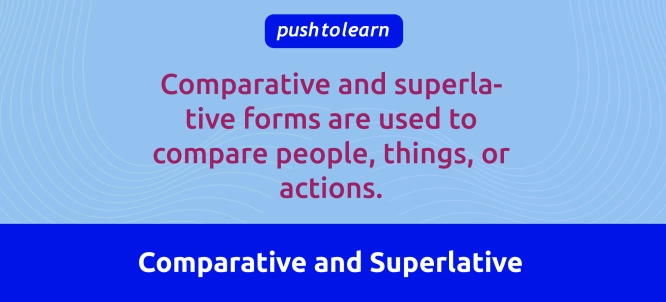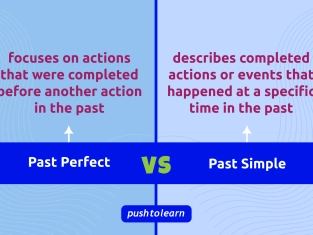by PushtoLearn
Comparative and Superlative Adjectives and Adverbs
Table of Contents
Comparative and Superlative Forms – Exercises
These exercises focus on Comparative and Superlative Forms
Comparatives
Comparatives show a comparison between two people, things, or actions.
Formation:
-
Short Adjectives/Adverbs (1 syllable or 2 syllables ending in -y):
Add -er to the end of the adjective or adverb.
Examples: -
Adjective: "tall" → "taller" ("John is taller than Mark.")
-
Adverb: "fast" → "faster" ("She runs faster than her brother.")
-
Long Adjectives/Adverbs (2+ syllables):
Use more before the adjective or adverb.
Examples: -
Adjective: "beautiful" → "more beautiful" ("This painting is more beautiful than that one.")
-
Adverb: "carefully" → "more carefully" ("He works more carefully than she does.")

Superlatives
Superlatives indicate the highest degree of a quality among three or more people, things, or actions.
Formation:
-
Short Adjectives/Adverbs:
Add -est to the adjective or adverb and use the before it.
Examples: -
Adjective: "tall" → "the tallest" ("John is the tallest in the class.")
-
Adverb: "fast" → "the fastest" ("She runs the fastest of all the athletes.")
-
Long Adjectives/Adverbs:
Use the most before the adjective or adverb.
Examples: -
Adjective: "beautiful" → "the most beautiful" ("This is the most beautiful sunset I’ve ever seen.")
-
Adverb: "carefully" → "the most carefully" ("She works the most carefully among her team.")
Irregular Comparatives and Superlatives
Some adjectives and adverbs don’t follow regular rules:
|
Base Form |
Comparative |
Superlative |
Examples |
|
Good |
Better |
Best |
"She is a good student, but he is better." |
|
Bad |
Worse |
Worst |
"This is the worst movie I’ve seen." |
|
Far |
Farther/Further |
Farthest/Furthest |
"He ran farther than me." / "This is the furthest I’ve been." |
|
Little |
Less |
Least |
"She spends less money than her brother." |
|
Much/Many |
More |
Most |
"I have more friends than he does." |
Comparatives and Superlatives of Adverbs
-
Adverbs with the Same Form as Adjectives:
Follow the same rules.
Examples: -
"She works harder than anyone else." (Comparative)
-
"He works the hardest of all." (Superlative)
-
Adverbs Ending in -ly:
Use more or the most.
Examples: -
"She speaks more fluently than her sister." (Comparative)
-
"He speaks the most fluently in the group." (Superlative)
Comparison Words
|
Word |
Use |
Example |
|
Than |
Used after comparatives |
"He is taller than his brother." |
|
As...as |
Shows equality |
"She is as smart as her friend." |
|
Not as...as |
Shows inequality |
"This book is not as interesting as that one." |
|
The...the |
Shows proportional comparison |
"The harder you work, the better you’ll do." |
Summary Table
|
Type |
Short Adjective/Adverb |
Long Adjective/Adverb |
Irregular |
|
Comparative |
Add -er: "faster" |
Use more: "more beautiful" |
"better," "worse," "farther" |
|
Superlative |
Add -est: "the fastest" |
Use the most: "the most beautiful" |
"the best," "the worst," "the farthest" |
FAQ About Comparatives and Superlatives
Can I use "more" and "-er" together?
No, you can’t combine them.
-
Incorrect: "more taller"
-
Correct: "taller"
Can I use "as...as" with superlatives?
No, "as...as" is only for equality, not superlatives.
Example: "She is as fast as her brother." (Not a superlative)
Are "farther" and "further" the same?
"Farther" is usually used for physical distance, while "further" can be used for metaphorical or non-physical distance.
Example: "He ran farther." / "We need to discuss this further."
What if an adjective or adverb is already extreme?
Some adjectives, like "perfect" or "unique," don’t take comparatives or superlatives because they describe absolute qualities.
Is "most" ever used with short adjectives?
Generally, no. Short adjectives use "-est," but "most" might appear in poetic or formal contexts for emphasis.
Have a look at other Grammar Exercises for B1 to get more practice.

